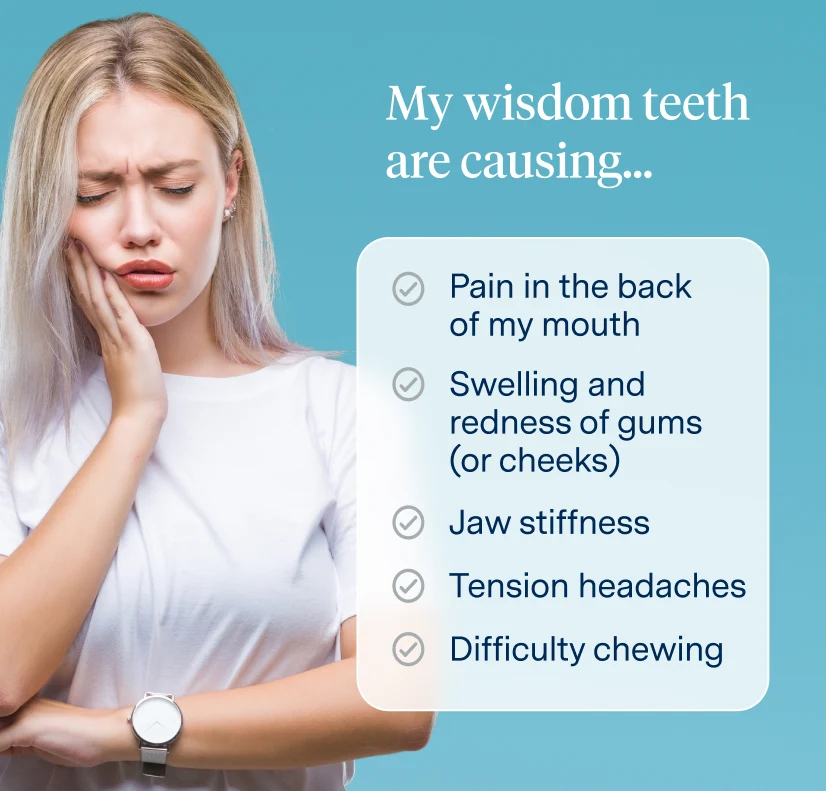Wisdom tooth pain
When we’re little, new teeth are celebrated. But by the time our wisdom teeth come around in our late teens and early twenties, they stop being exciting—and can start being a real pain. Sometimes so much, they need to be removed. That’s when your Aspen Dental care team can help.
What causes wisdom tooth pain?
Wisdom teeth (also called third molars) are the final set of molars that come in at the back of your mouth. For some, their arrival can be painful—which is caused by a few factors, including:
Limited space
Impaction
Inflammation
Fluid-filled cysts
Gum infection
Nerve irritation
Wisdom teeth symptoms
If you’re like most adults who still have their wisdom teeth, you may experience pain when they start coming in. The pain can range from mild to severe—but some may not feel any discomfort at all. What wisdom tooth-related symptoms are you experiencing?
Wisdom tooth pain relief and treatment
How long does wisdom tooth pain last? Well, it depends on how long they take to surface and whether or not there are any complications that require attention from your Aspen Dental care team.
Here’s a few ways to help ease the pain:
Saltwater rinse
Rinsing with warm salt water multiple times a day can help decrease inflammation and keep the area clean.
Cold compress
Holding a cold compress or ice pack to your cheek for 20-minute intervals can help numb the area and reduce swelling.
Head elevation
Elevating your head, especially while you're sleeping, can minimize blood flow to the area and reduce swelling.
Avoid irritants
Tobacco, alcohol and spicy foods can make pain worse and slow the healing process.
Wisdom teeth removal: pain relief is near
If your wisdom teeth fail to come in correctly, your Aspen Dental care team may recommend removing them to relieve pain or prevent future problems. Wisdom tooth extraction is a standard procedure that can improve your oral health. During your wisdom tooth procedure your care team will make sure you are comfortable.
If the pain is intense, persistent or accompanied by symptoms like fever or difficulty swallowing, call your local Aspen Dental for guidance. They can evaluate the situation and suggest suitable treatments, which might involve extraction if necessary.
Wisdom tooth pain FAQs
How long does pain after wisdom tooth surgery last?
The duration you may experience discomfort after wisdom tooth surgery is different for everyone. Typically, you will be most uncomfortable during the first few days after your procedure. You may continue to have some discomfort as your surgical site heals, which could take several weeks. Follow the instructions provided by your Aspen Dental dentist and call if you have concerns or if your pain increases.
Can wisdom tooth cause ear pain?
Yes, wisdom teeth can sometimes cause referred pain to the ears. The wisdom teeth are located right next to the ears and the interconnected nerves can cause discomfort. If you’re experiencing ear pain along with wisdom tooth discomfort, call your local Aspen Dental for an evaluation.
What does wisdom tooth pain feel like?
Wisdom tooth pain is often described as a persistent, dull throb in the rear of the mouth where the teeth are located. The discomfort may range from mild to severe and may be accompanied by stiffness in the jaw, swelling and pain in the ears or head.
How painful is wisdom tooth removal?
When it comes to any tooth extraction, you will always feel pressure, but generally not pain. If you are feeling a sharp pain during the procedure, let your dentist know and they will make sure you are more comfortable with the use of additional anesthetic and/or pain management techniques. A number of Aspen Dental practices have an oral surgeon who can also provide sedation to ensure you are comfortable, especially if your wisdom teeth are impacted.
What are the risks of untreated wisdom tooth pain?
Untreated wisdom tooth pain can pose several risks and complications. Impacted wisdom teeth can lead to infections like pericoronitis, which causes swelling, pain and difficulty opening the mouth. Over time, cysts or tumors might form, potentially damaging the nearby teeth and jawbone. It’s important to consult your dentist if you are experiencing wisdom tooth pain.
Discover more for your smile
Relief from your wisdom teeth pain
Some discomfort is common when your wisdom teeth come in, but if you are experiencing severe pain, headaches or ear pain, contact your local Aspen Dental for a consultation. We can help keep you comfortable and remove the teeth if necessary.

